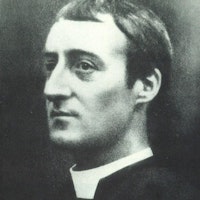Glory be to God for dappled things— for skies of couple-colour as a brinded cow; for rose-moles all in stipple upon trout that swim; fresh-firecoal chestnut-falls; finches’ wings; landscape plotted and pieced—fold, fallow, and plough; and áll trádes, their gear and tackle and trim.
Glory be to God for dappled things— for skies of couple-colour as a brinded cow; for rose-moles all in stipple upon trout that swim; fresh-firecoal chestnut-falls; finches’ wings; landscape plotted and pieced—fold, fallow, and plough; and áll trádes, their gear and tackle and trim.
Gerard Manley Hopkins

Pied Beauty
Topic: The Natural World
PIED BEAUTY
Glory be to God for dappled things—
For skies of couple-colour as a brinded cow;
For rose-moles all in stipple upon trout that swim;
Fresh-firecoal chestnut-falls; finches’ wings;
Landscape plotted and pieced—fold, fallow, and plough;
And áll trádes, their gear and tackle and trim.
All things counter, original, spare, strange;
Whatever is fickle, freckled (who knows how?)
With swift, slow; sweet, sour; adazzle, dim;
He fathers-forth whose beauty is past change:
Praise him.
Gerard Manley Hopkins was born on July 28, 1844, in Stratford, Essex, England, into a devout Anglican family. His early life was marked by a keen interest in religion and the arts, nurtured within a creative and intellectual environment. Hopkins attended Highgate School and later Balliol College, Oxford, where he excelled in classics and literature. It was during his time at Oxford that Hopkins converted to Roman Catholicism, profoundly influenced by the works of John Henry Newman, a cardinal and leader in the Oxford Movement. This conversion was a pivotal moment in Hopkins' life, leading him eventually to join the Society of Jesus (Jesuits) in 1868. His decision reflected a deep spiritual calling, with his faith becoming the central pillar of his life and work.
As a Jesuit priest, Hopkins' life was one of spiritual duty and intellectual rigor. He was sent to various parts of Britain for his religious and scholarly duties, which included teaching and parish work. Despite the demands of his religious vocation, Hopkins continued to cultivate his passion for poetry. He developed an innovative style, notably his concept of 'sprung rhythm', a departure from traditional metrical patterns, which gave his poetry a unique musical quality and a vivid sense of natural speech. His poetry was infused with rich imagery and profound spiritual themes, often reflecting his intense observations of nature and deep religious convictions. Hopkins' poetry remained largely unpublished during his lifetime, as he saw his writing as an extension of his religious vocation, meant primarily for self-expression and glorification of God rather than public acclaim.
Hopkins' legacy as a poet was not fully recognized until after his death on June 8, 1889. His friend and fellow poet, Robert Bridges, posthumously published his works, revealing Hopkins' profound influence on the world of Victorian poetry. His poems, such as "God’s Grandeur" and "The Windhover," are celebrated for their innovative use of rhythm, language, and imagery, and their deeply spiritual nature. Hopkins' work bridges the realms of art and faith, presenting a vision of the world imbued with divine presence and beauty. His exploration of nature and religion, conveyed through his unique poetic voice, has established him as a significant figure in English literature and a source of inspiration for readers seeking a deeper understanding of the spiritual dimensions of life and the natural world.
Pied Beauty
Hopkins, Gerard Manley. Pied Beauty: a Selection of Poems. Edited by Simon King, Simon King Press, 1994, [Gerard Manley Hopkins. Pied Beauty (1877)]

Gerard Manley Hopkins
Copyright © 2017 – 2025 LuminaryQuotes.com About Us

Additional Gerard Manley Hopkins Poems
The Windhover (To Christ our Lord)
I caught this morning morning’s minion, king-
dom of daylight’s dauphin, dapple-dawn-drawn Falcon, in his riding
Of the rolling level underneath him steady air, and striding
High there, how he rung upon the rein of a wimpling wing
In his ecstasy! then off, off forth on swing,
As a skate’s heel sweeps smooth on a bow-bend: the hurl and gliding
Rebuffed the big wind. My heart in hiding
Stirred for a bird,—the achieve of; the mastery of the thing!
Brute beauty and valour and act, oh, air, pride, plume, here
Buckle! AND the fire that breaks from thee then, a billion
Times told lovelier, more dangerous, O my chevalier!
No wonder of it: shéer plód makes plough down sillion
Shine, and blue-bleak embers, ah my dear,
Fall, gall themselves, and gash gold-vermillion.
Hurrahing in Harvest
SUMMER ends now; now, barbarous in beauty, the stooks arise
Around; up above, what wind-walks! what lovely behaviour
Of silk-sack clouds! has wilder, wilful-wavier
Meal-drift moulded ever and melted across skies?
I walk, I lift up, I lift up heart, eyes,
Down all that glory in the heavens to glean our Saviour;
And, éyes, heárt, what looks, what lips yet gave you a
Rapturous love’s greeting of realer, of rounder replies?
And the azurous hung hills are his world-wielding shoulder
Majestic—as a stallion stalwart, very-violet-sweet!—
These things, these things were here and but the beholder
Wanting; which two when they once meet,
The heart rears wings bold and bolder
And hurls for him, O half hurls earth for him off under his feet.
–Gerard Manley Hopkins [Wessex Poems and Other Verses (1918)]